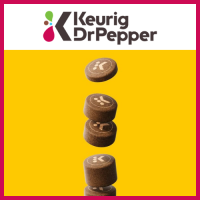Keurig Introduces New K-Cup Alternative

Keurig is launching plastic-free coffee pods called K-Rounds. COURTESY OF KEURIG DR PEPPER
Keurig coffee machines and their K-Cup pods are staples in millions of homes and offices across the country. Now, the Massachusetts-based java juggernaut is looking to beat itself at its own game.
On Wednesday, Keurig Dr Pepper announced a pair of new products: Plastic-free “K-Rounds” — tightly packed coffee grounds encased in a plant-based finish rather than a disposable cup — and a machine, the Keurig Alta, compatible with the new disk-like capsules.
It’s an announcement that caps off a five-year research and development effort at the company’s Burlington headquarters, said Philip Drapeau, the senior vice president of future coffee systems at the publicly traded firm.
In trying to innovate on the brewing process, “we came back to the constraints of the packaging itself,” said Drapeau. The traditional, plastic K-Cups could contain only so much coffee, and withstand only certain temperatures and pressures, he said.
The team in the Burlington office — which employs more than 600 workers — came across a Swiss company, CoffeeB, which debuted similarly self-contained “coffee balls” in 2022. Keurig then locked down a licensing deal with CoffeeB parent Delica AG.
Thus, the K-Round was born.
The rounds, said Drapeau, will provide “a much wider canvas on which to go create the beverages” — able to produce a crema-topped shot of espresso, a cold coffee, or a normal hot cup of joe, depending on their size.
“When we start working with just the coffee,” said Drapeau, “that’s where the real coffee expertise can come in.”
The plastic-free pods work similarly to the system on the market now: A user places the round in the Keurig machine, which “reads” a code embedded on the pod to determine the ideal brewing setting, similar to the ‘BrewID’ technology currently in use with K-Cups. After the brew is complete, the plant-based casing will remain intact and can be discarded (the company is in the process of getting the pods certified compostable).
The rounds are a new development in the now-saturated single-serve coffeemaker market, where Keurig faces competition from brands such as Nespresso, Cuisinart, and Ninja. One prevailing concern among consumers is that coffee pods are worse for the environment than traditional drip coffee, though some research has pushed back against that belief.
Indeed, Keurig — which merged with Dr Pepper in 2018 and has dual headquarters in Burlington and Frisco, Texas — sees the K-Rounds as a sustainability push. Since 2020, all K-Cups have been made of #5 plastic, also known as polypropylene, which is recyclable, but not every municipality accepts the pods. (Boston, for instance, instructs residents to dump them in the garbage.)
The company also announced Wednesday that later this year, it would begin a mail-back recycling program for consumers unable to recycle the pods curbside in their communities.
“Our steps on K-Cups are something we’re very proud of,” said Patrick Minogue, president of US Coffee for the company, “but then looking forward, K-Rounds plastic-free pods is obviously a big step forward on the sustainability story, and it’s where we’ll obviously put a lot of focus going forward.”
The K-Rounds and the Alta machine will be released in beta as early as this fall — interested coffee lovers can apply to be a tester at keurig.com/krounds — but there is no timeline yet for rolling out the products to the general public, said Drapeau.
So for those who just splashed out on a new Keurig machine, don’t worry; “the K-Cup format is going to be here for a very long time to come,” said Minogue. When the new Alta machine is released, it will continue to work with traditional K-Cups, which use coffee from brands such as Starbucks, Dunkin’, and Peets Coffee.
“Think about cars and electric cars,” said Drapeau. “That infrastructure, that technology transition, takes time. It takes a lot of time.”
Article via The Boston Globe
By Dana Gerber
-
Dana Gerber
- March 15, 2024
- Send Email


